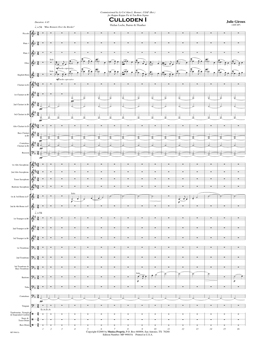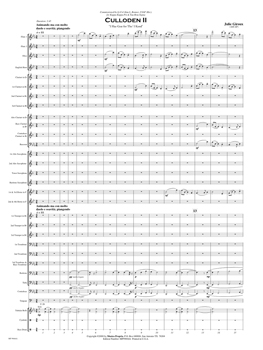Instrumentation
1 - Piccolo
4 - Flute 1
4 - Flute 2
2 - Oboe
1 - English Horn
1 - E♭ Clarinet
4 - B♭ Clarinet 1
4 - B♭ Clarinet 2
4 - B♭ Clarinet 3
2 - E♭ Alto Clarinet
2 - B♭ Bass Clarinet
1 - B♭ Contrabass Clarinet
1 - E♭ Contrabass Clarinet
2 - Bassoon
2 - E♭ Alto Saxophone 1
2 - E♭ Alto Saxophone 2
2 - B♭ Tenor Saxophone
1 - E♭ Baritone Saxophone
2 - F Horn 1 & 3
2 - F Horn 2 & 4
3 - B♭ Trumpet 1
3 - B♭ Trumpet 2
3 - B♭ Trumpet 3
2 - Trombone 1
2 - Trombone 2
2 - Trombone 3 & Bass Trombone
2 - Baritone Horn B.C.
2 - Baritone Horn T.C.
4 - Tuba
1 - Contrabass
1 - Timpani
3 - Snare, Tenor, & Bass Drum
3 - Auxiliary Percussion
(Tambourine, Triangle,
Cymbals, & Tubular Bells)
Culloden, Movement I (4:45)
Grade 4
by Julie Giroux
Heilan Lochs, Bairns & Heather
Scotland – just that one word brings to mind the sounds of bagpipes, fiddles and drums, the rolling green hills and moors; the dark, still waters of the lochs; kilts and plaids…a kaleidoscope of colorful sounds and pictures. This movement attempts to capture just that – only it is the Scotland of 1745 that you will hear. They are songs about love, war, whiskey, and women; places and people long gone or changed. Woven into a movement that sounds like an aerial overview of Scotland, these short 8 and 16 bar tunes/songs originally had no accompaniment or only that of a single drone. Most were with endless lyrics. Here, they have been brought back to life in a depth and understanding that they must have had all along. These melodies sprang onto my score pages decked in full regalia, wearing the plaids of their ancestors. Simple they may be, but pull on your heart strings they will, for they pulled on mine something fierce. For the most part, I let them be.
To see and hear the score: Culloden, Movement I
Culloden, Movement II (2:45)
I Hae Grat for Tho’ I Kend
(I have wept for those I knew)
Grade 4
"Bloody Culloden," so justly nicknamed, left in its wake a river of destruction and death. So many lives were ruined or changed forever; it affected husbands, sons, wives and daughters and a way of life that would never be again. "I Hae Grat for Tho’ I Kend" is a lamentation for them. In order to compose this particular work, I had to draw not only from their losses, but also my own. The opening line (in 3/4) is underscored by the Latin/Gaelic death chant (in 4/4) which is accompanied by the tubular bells (church bells). The middle section sounds almost hopeful for a reason. It represents the "good" that comes from such an experience, in addition to the good we remember of the departed. The movement is set in an order of dealing with grief: the actual funeral, the anger, the weeping, the fond memories and the acceptance.
Dedicated to the thousands of men and women of Kappa Kappa Psi
and Tau Beta Sigma who have served university bands because of their love of bands and music
Culloden (pronounced cuh-LAH-d’n) is an attempt to present the folk & Gaelic "commoners’" music from the 1745-6 period of Scotland in my own way, without losing its original charm and flavor. To be exact, the goal was to compose one large, flowing, multi-movement work, a symphony for band, using as many as I could of those 8 and 16 bar tunes/songs. The melodies were originally for bagpipe, fiddle or voice, and had either no accompaniment or only a drone. The hundreds of hours of research alone would have prompted me to compile them into a work of some kind, but after immersing myself in the history, the music and overall "flavor" of the period, I became extremely fond of these tunes and my desire to see them breathe the air of the 21st century became overwhelming.
I have set, in the past, a very strict rule for myself: I compose. I do not arrange or use anybody else’s music. Period. I have more than enough imagination than is good for me, so this has never presented a problem...until now. With the music of Culloden, I had to use the tunes. It would have been a million times easier to compose Culloden from scratch, which was my original intent. But thanks to a lengthy conversation with James Barnes, I came to see the historical and creative merit in doing variations or sets of ancient and/or folk music. None of the tunes I used could be traced to a composer. This is a sad fact. It will be a rare person indeed who, upon listening to Culloden, even recognizes more than a couple of the tunes I used. That is another sad fact – one that I hope will be altered by this work.
I came across so much American heritage in these little tunes, that I became even more enthralled with the whole project. I got to see "London Bridge," "Yankee Doodle," "The Arkansas Traveler" (who HAD to have been Scottish or Irish), "Oh Susannah," and at least 60 other standard "American" folk tunes in their earlier forms (some were almost exactly the same, not to mention a few of Stephen Foster’s tunes which popped up! Whoops!). Needless to say, after all has been said and done, I have found that folk music belongs to no one and, at the same time, to us all. I just tried to shake a few cobwebs off some folk tunes that never should have been forgotten in the first place. (In the course of my research, I came across another interesting fact: The "Scots" STILL love a good fight! You should see some of my e-mail!) Additional historical notes follow the first movement.
Julie Giroux


Home | Composers | Grade Levels | Order Form | Contact
©2010 Musica Propria, Inc.


